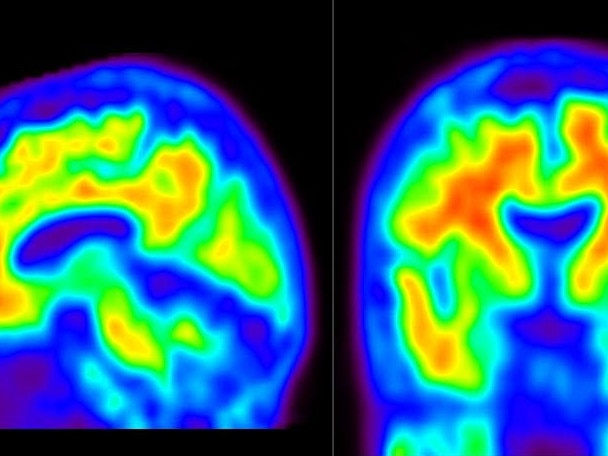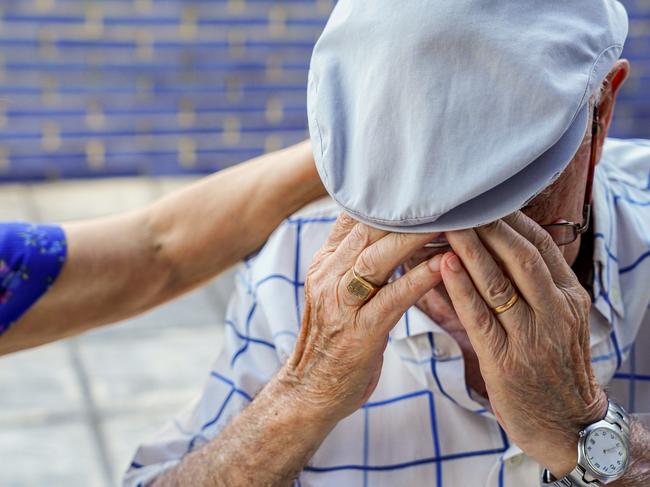Florey team discover ‘game-changer’ to reverse Alzheimer’s disease
A promising treatment for devastating Alzheimer’s disease — that reboots part of the immune system to “gobble up” sticky and tangled brain proteins — holds hope for hundreds-of-thousands of Australians.
Victoria
Don't miss out on the headlines from Victoria. Followed categories will be added to My News.
A new treatment to delay or even reverse Alzheimer’s disease is a step closer after Victorian scientists discovered how to reboot part of the immune system that “gobbles up” plaque-causing amyloid-beta in the brain.
Alzheimer’s disease (AD) is the most common form of dementia and is characterised by the accumulation of sticky amyloid-beta and tangled tau proteins in the brain which are thought to cause cognitive decline.
While work has progressed on blood tests to detect and diagnose the disease earlier, and several drugs are in clinical trials to show they can safely remove these plaque-causing proteins after they have formed, until now a treatment to stop it in its tracks has eluded scientists.

A team led by Florey scientist Dr Xin Huang has discovered a type of mobile white blood cell called peripheral monocytes that can cross the blood-brain barrier and clean up amyloid-beta.
They are, he said, like professional scavengers in our body and their role is to help identify and eliminate pathogens, clear dead cells and modulate inflammation.
Dr Huang’s team was able to prove these monocytes also carried off a large amount of amyloid-beta in blood samples taken from cerebrospinal fluid, but their capability to do this diminishes with age.
He said previous studies showed that when there was inflammation of the nervous tissue, known as neuroinflammation, it activates the white blood cells into action and transforms them into anti-inflammatory warriors.
“In this state, they effectively clear plaques but if this inflammation persists without resolution, these cells can become overwhelmed and lose their ability to function properly,” he said.

Dr Huang said it was this deficit in the clearance of plaques that could be the key factor in the progress of AD.
“By once again promoting the monocyte’s ability to gobble up amyloid-beta and other protein aggregates, AD can be managed,” he said.
That is what is now driving his team as they work towards developing a new drug that can return the scavenger function to these white blood cells.
“This insight not only reshapes our understanding of monocytes in Alzheimer’s but also opens new avenues for potential treatments,” Dr Huang said.
The next steps will be to test their theory in preclinical models with AD, a trial expected to start at the Florey in 2025.

Dr Huang told the Herald Sun he believed it could lead to the development of an immunotherapy drug that could be injected after a blood test confirmed signs of amyloid-beta in a patient’s brain.
The patients would then have weekly injections until a screening blood test confirmed the protein had been cleared.
“It may be possible to restore the ability of these cells to effectively clear amyloid plaques.” Dr Huang said. “I believe we can delay the development of AD.”
This discovery was published in Nature Communications and described as a groundbreaking finding.
It comes as Florey researchers revealed in the Herald Sun they had confirmed the accuracy of a game-changing blood test to detect biomarkers for AD.
Dr Huang said the blood test would work with the immunotherapy drug his team was developing.
“From early results of our animal experiments, our drug reduced brain amyloid-beta loading, increased the level of long-term learning and memory and raised energy metabolism to a higher level,” he said.
“These dramatic effects indicate the drug may be used for late stage AD patients as well and it has the potential to reverse progress of the disease.
“We are on the right path, but there is a long way to go from our bench findings into clinical practice.”
AT A GLANCE
An estimated 472,000 Australians live with dementia and Alzheimer’s disease
It is a disease of the brain that affects memory, thinking and behaviour
Likely triggered by the build-up of sticky amyloid-beta and tau proteins
Originally published as Florey team discover ‘game-changer’ to reverse Alzheimer’s disease




